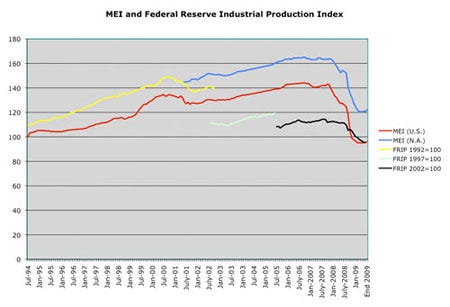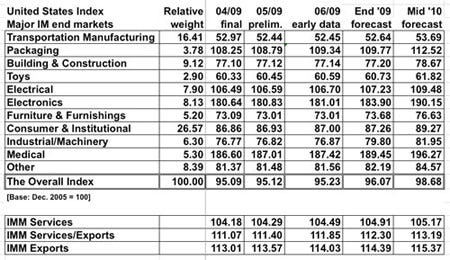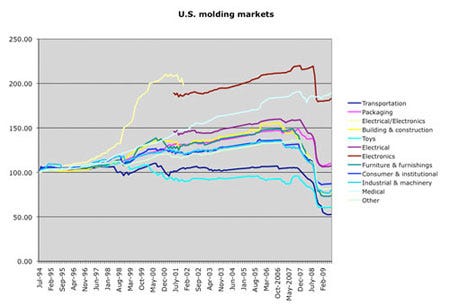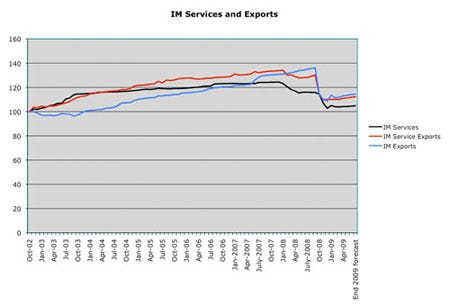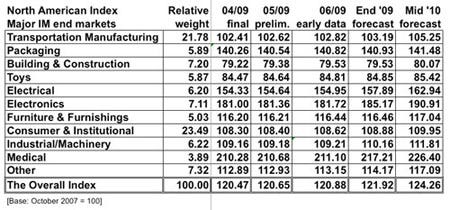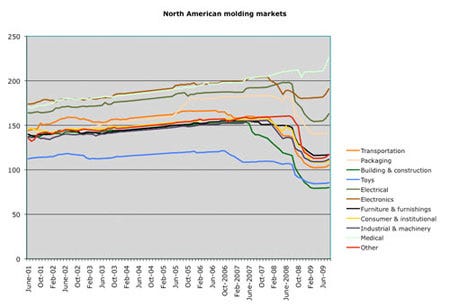Molders Economic Index: The tide has turned
Initial reports from Germany indicate that country’s economy rebounded in the second quarter of this year and is no longer in recession. Note that Germany is Europe’s largest economy and was hit with an economic contraction of about 3.8%. Now it appears that the German economy leveled off in May and will show slight growth for the second quarter.
July 20, 2009
Initial reports from Germany indicate that country’s economy rebounded in the second quarter of this year and is no longer in recession. Note that Germany is Europe’s largest economy and was hit with an economic contraction of about 3.8%. Now it appears that the German economy leveled off in May and will show slight growth for the second quarter.
|
Germany is the world’s largest exporter, measured in monetary terms, and its exports were down by nearly 10% the first quarter. Germany’s May output grew 3.7%, the fastest rate in 16 years, while orders surged to a near two-year high. May exports grew 0.3%. While that may sound small, it represents an added $87.7 billion in business from April to May. Germany’s trade surplus also grew in May to a10.3 billion, which is a1.3 billion higher than in April. France and Italy also posted jumps in May output.
South Korea, India, Canada, and Great Britain also showed solid gains in May. Japan did not fare as well, showing drops in both prices and demand in May. These are leading indicators of deflation, which can be just as serious as inflation. If you recall, the last time Japan experienced a deflationary spiral it extended their recession. Consumers postponed major purchases because they saw the prices falling lower each month. No one wanted to pay more than they had to, but they were destroying profit margins along the way. After a couple of years, pent-up demand exploded. Buyers went on a feeding frenzy that pulled the Japanese economy out of its slump and helped to stabilize it.
Signs of hope for U.S. manufacturers
May figures for the United States show signs of improvement. New orders for manufactured goods to U.S. factories rose by 1.2% in May and orders for durable goods rose by 1.8%. Economists who believed the economy had bottomed out were predicting these indicators to hit 0.5-1.0% in May, so these numbers are solid indications that the U.S. is exiting the recession.
The Institute for Supply Management’s manufacturing survey for June indicated that while the U.S. economy experienced overall growth for the second consecutive month, the manufacturing sector failed to grow in June for the 17th consecutive month.
According to Norbert J. Ore, chair of the Tempe, AZ-based firm, “Manufacturing continues to contract at a slower rate, but the trends in the indexes are encouraging as seven of 18 industries reported growth in June. Most encouraging is the gain in the Production Index, which is up 12.1 percentage points in the last two months to 52.5%. Aggressive inventory reduction continues and indications are that the destocking cycle is at or near the end in most industries, as the Customers’ Inventories Index remained below 50% for the third consecutive month. The Prices Index was unchanged from May, indicating that the supply/demand balance is improving. Overall, a slow recovery for manufacturing is forming based on the current trends in the ISM data.” The transportation sector rose by 3.8%, propelled by a 68.7% increase in orders for commercial aircraft.
June’s U.S. auto sales continued to be off across the boards, with a meager 4.8 million units sold during the first half of the year. To put it in perspective, the United States sold 16 million vehicles in 2004.
In the U.S., Ford sold the most cars during the first six months of 2009 but was still down 10.9% in June. Toyota came in second, but was still off by 31.9% in June. GM declined 33.6% and Chrysler slid 42%. Honda and Nissan posted June sales declines of 29.5% and 23.1% respectively.
Conversely, China actually surpassed the U.S. to become the world’s largest auto market, selling 6.1 million units the first half of 2009, a 17.7% increase compared to the same time last year. Ford was among the best sellers and saw first-half sales in China rise 14%.
Computer sales fell 1.1% in part due to Microsoft’s announcement that it is pulling Windows Vista and launching Windows 7. Sales of units loaded with Vista dropped like a stone as potential buyers backed off, fearing they would be stuck with an outmoded and unpopular operating system. We expect to see these sales rebound with back-to-school purchases and deals popping up that offer a free upgrade to Windows 7 or a retrograde to Windows XP.
Oil, gas, and housing
Oil prices inched up in the first half of the year and have leveled off at about $70/bbl. We anticipate that oil prices will not exceed $75/bbl in the next few months, barring any major hurricanes in the Gulf Coast region.
U.S. average prices for regular-grade gasoline, which reached $2.69/gal in the June 22 weekly survey of the Dept. of Energy’s Energy Information Administration, have fallen back slightly. Gasoline prices are expected to stay near current levels but will be strongly influenced by any changes in crude oil prices.
The monthly average Henry Hub natural gas spot price is expected to remain below $4/Mcf until late in the year, given plentiful U.S. natural gas supplies and weak demand, particularly in the industrial sector.
There’s significant news on new home construction and it’s not good. A survey by the National Assn. of Home Builders reported that 26% of builders are seeing signed sales contracts fall through the cracks because appraisals on homes are coming in below the contract sales price. The survey showed that nearly 60% of builders are reporting that inadequate appraisals are causing serious problems in the market, with the biggest problem being homes sold in distress sales and foreclosures being used by appraisers as “comparables” of new single-family homes. Of those who reported being faced with appraisal problems, 54% said that the appraisal amount was actually less than the cost of building the home.
On July 10, Freddie Mac issued a Guide Bulletin publicly stating that it does not require appraisers to use foreclosures or short sales in selecting comparable sales to provide an accurate opinion on home values based on market data. Freddie further stipulated that appraisers must “certify that comparable sales chosen are those most similar to the subject property.” While the bulletin does not forbid using cut-priced housing as part of appraisals, it clarifies that appraisers need not feel compelled to include it, which may help to alleviate the problem.
The news regarding pending home sales is terrific. They show a sustained uptrend, rising for four consecutive months with favorable housing affordability and a first-time-buyer tax credit boosting activity. According to the National Assn. of Realtors, the last time there were four consecutive monthly gains was in October 2004. New home sales have traditionally been stimulated when existing homes available for sale fall below a three-month supply.
Factors affecting consumers and businesses
The U.S. Dept. of Agriculture is projecting ample crop supplies across the board for the remainder of the year. This is good news to consumers who suffered from more than two years of agflation. Since food is one staple no one can cut, higher food prices often mean consumers buy cheaper food and cut back in other areas such as retail items that can impact molders.
Depending on where you’re located, you may feel a pinch from the minimum wage increase. On July 24 the U.S. federal minimum wage went from $6.55 to $7.25/hr. According to the U.S. Dept. of Labor, this moved affected 29 states. The other 21 states and Washington, DC already observe local minimum wages that meet or exceed $7.25/hr. Even if you don’t have anyone at your plant working at minimum wage, you may feel the impact in slightly higher prices from firms that are paying their staff the legal minimum.
Lisa M. Pellegrino ([email protected]) is a senior advisor of The Repton Group LLC (New York, NY).
About the Author(s)
You May Also Like
